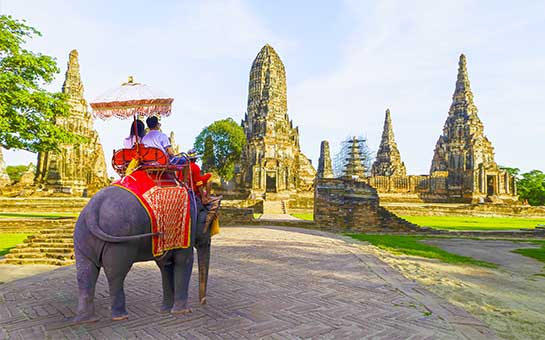If you are planning a vacation somewhere in south or southeast Asia, you may have plans to go elephant riding. The activity is particularly popular in India and in Thailand. There is something undoubtedly thrilling about riding such a majestic animal.
Let's be straight here: Elephant tourism is not as favored of a vacation activity as it used to be. Animal lovers have labeled it as a cruel pastime. There are strong demands for a complete ban on elephant rides. Many national parks and sanctuaries have already done that, also. But not all.
So, if you have plans to ride an elephant, you should first check out which destinations still offer it. Second, don't forget to buy your travel insurance for elephant riding.
Also, even with your elephant riding travel insurance, make sure to look for a government-certified company. There are several issues of safety involved, both yours and the animals'.
Travel Insurance for Elephant Riding
Very few standard travel insurance plans would cover medical costs for injuries caused by a fall from an elephant's back. This is where elephant riding hazardous sports travel insurance fills in the gaps. Buy travel insurance for elephant riding and enjoy the peace of mind. Your elephant riding travel insurance will not eliminate the risks involved. But it will cover the medical expenses that you might need to incur.
Introduction to Elephant Riding
There are several things you need to know before you ride an elephant. You should always approach an elephant from the side. If you move towards it from the front or the back, the elephant may not be able to see you. Further, it is best to approach an elephant from the right. Mahouts (elephant guides) often train elephants to attack anyone appearing from the left.
There are many ways to mount an elephant, which the mahout will explain to you. He will get the elephant to kneel down for you. You can then use the trunk or the bent knee on the front right to mount.
However, do be quick. The elephant might start to stand up, and you'll be in trouble if you're not properly mounted. This is one risk among the many that make it wise for you to purchase adventure sports travel insurance.
Sit as close to the trunk as possible, and put your legs right behind the elephant's ears. Make sure that the mahout travels with you.
Also, remember that if there's a stream or any other water body on your route, the elephant might want to play there. You could get wet, so be sure to dress appropriately.
Risks of Elephant Riding
Depending on the length of your elephant ride, as well as the quality of the terrain, you will most likely get mild to severe body aches.
There are riskier things that can happen, though. Falling off while you try to mount the elephant is always a possibility. The extent of injuries will depend on the height from which you fall.
Also, despite all their training, elephants are still wild animals. There have been reported cases of elephants veering off into a forest and throwing riders off their backs. It is rare, but it happens.
That's why it makes sense to have travel medical insurance for elephant riding.
We wish you a safe elephant-riding experience!

